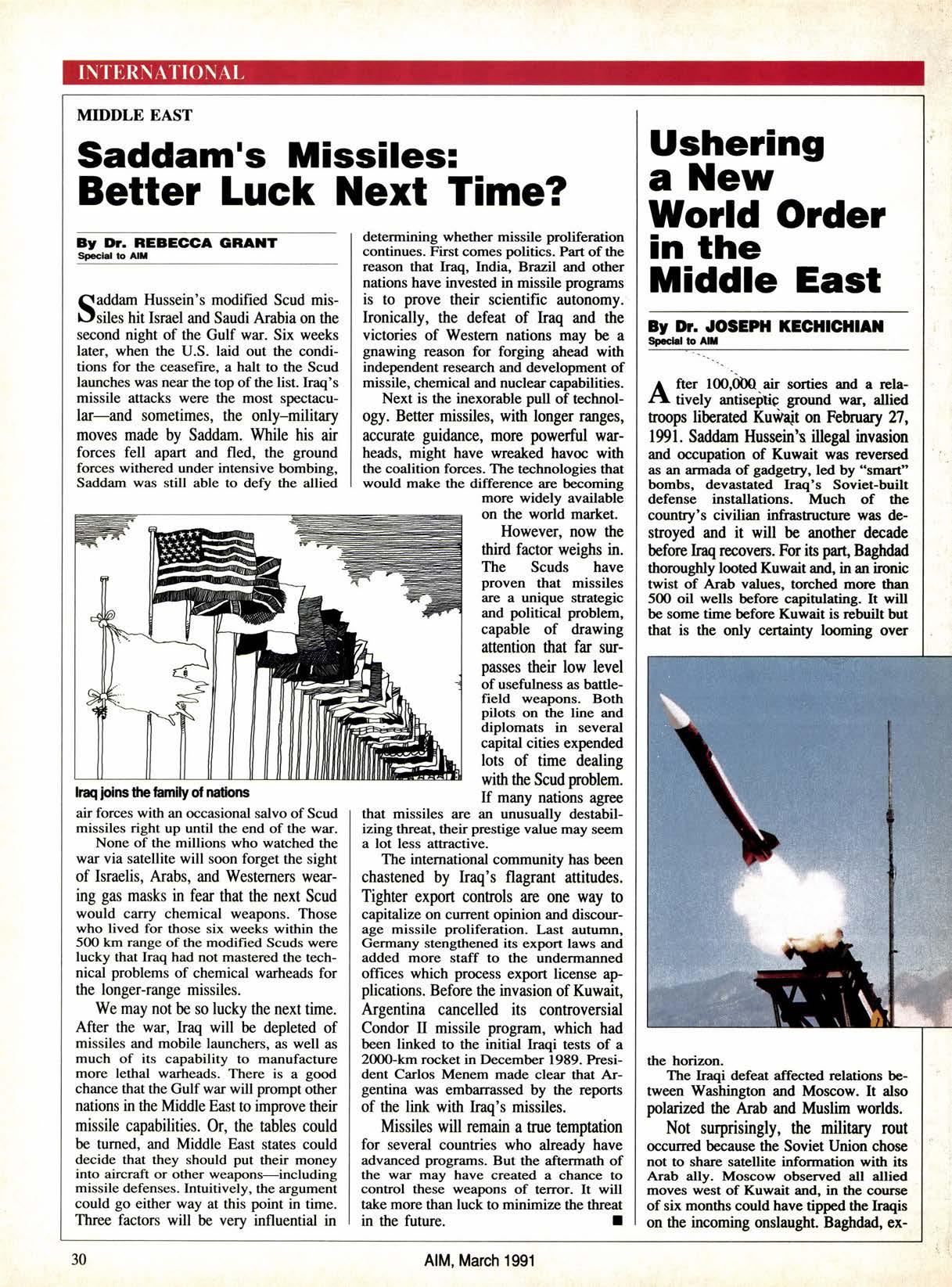
3 minute read
Ushering a New World Order in the lliddle East
By Dr. JOSEPII KEClllGlllAX Sp.chl io AI
haq iins theirnily ol ndk rts air forces with an occasional salvo of Scud missiles right up until the end of the war.
Advertisement
None of the millions who watched the war via satellite will soon forget the sight of Israelis, fuabs, and Westemers wearing gas masks in fear that the next Scud would carry chemical weapons. Those who lived for those six weeks within the 5OO km range of the modified Scuds were lucky that Iraq had not mastered the technical problems of chemical warheads for the longer-range missiles.
We may not be so lucky the next time. After the war, haq will be depleted of missiles and mobile launchers, as well as much of its capability to manufacture more lethal warheads. There is a good chance that the Gulf war will prompt other nations in the Middle East to improve their missile capabilities. Or, the tables could be turned, and Middle East states could decide that they should put their money into aircraft or other weapons-including missile defenses. Intuitively, the argument could go either way at this point in time. Three factors will be very influential in
However, now the third factor weighs in. The Scuds have proven that missiles are a unique strategic and political problem, capable of drawing attention that far surpasses their low level of usefulness as battlefield weapons. Both pilots on the line and diplomats in several capital cities expended lots of time dealing with ttrc Scud pnoblem. If many nations agree that missiles are an unusually destabilizing threat, their prestige value may seem a lot less attractive.
The international community has been chastened by kaq's flagrant attitudes. Tighter export conftols are one way to capitalize on curent opinion and discourage missile proliferation. Last autumn, Germany stengthened its export laws and added more staff to the undermanned offices which process export license ap plications. Before the invasion of Kuwait, fugentina cancelled its conEoversial Condor tr missile program, which had been linked to the initial Iraqi tests of a 2OOO-km rocket in December f989. President Carlos Menem made clear that Argentina was embarrassed by the reports of the link with lraq's missiles.
Missiles will remain a true temptation for several countries who already have advanced programs. But the aftermath of the war may have created a chance to control these weapons of teror. It will take more than luck to minimize the threat in the future.
After l00,mQ air sorties and a rpla- A tively antiseitic ground war, allied noops liberated Kuwalt on February 27, 1991. Saddam Hussein\ illegal invasion and occupation of Kuwait was rcvened as an armada of gadgetry, led by "smart" bombs, devastated Iraq's Soviet-built defense installations. Much of the country's civilian infrastructure was desroyed and it will be another decade beforc kaq recovers. For its put, Baghdad thoroughly loorcd Kuwait and, in an ironic twist of Arab values, torched more than 5fl) oil wells before capiolating. It will be some time before Kuwait is rebuilt but that is the only certainty looming over the horizon.
The Iraqi defeat affected relations between Washington and Moscow. It also polarized tlrc Arab and Muslim worlds.
Not surprisingly, the military rout occurrcd because the Soviet Union chose not to share satellite information wi0r its Arab ally. Moscow observed all allied moves west of Kuwait and, in the course of six months could have tipped the Iraqis on the incoming onslaught. Baghdad, exAlM, pecting a large amphibious anack, had positioned most of its forces to face the Persian Gulf. Why the Soviets chose not to share this information with Iraq may be explained by their perceptions of the emerging new world order as well as their expectations from the U.S. Severely challenged at home, Gorbachev and his allies weighed costs and benefits and opted for closer economic ties with the West. They also extricated a subtle silence from the West on developments in the Baltic Republics.
In the Arab world, kaq's defeat further polarized the street, where antiWestem sentiments smoldered under a humiliating avalanche. It will only be a matter of time before conservative leaders face the music, unless they move forcefully on the much touted reform track. t-ed by Kuwait, all Persian Gulf conservative monarchies have now a unique opportunity to usher true democratic institutions, encourage popular participation, and initiate genuine economic
Soviet Ijnion
reforms throughout the Middle East by investing within the region. Whether this oppornrnity will be seized is difficult to ascertain, but its viability may largely depend on how the victorious allies want to be perceived in the Arab and Muslim worlds for the balance of the century and beyond.
Victory against Saddam Hussein has also set a unique precedent. For the fust time since World War II, the United Nations was called upon to affix its imprimatur to right a perceived wrong. How it responds to other regional crises will either enhance its credibility or set in motion its permanent demise. In this way, at least, Saddam Hussein's brutality may in fact bring a dose of hope for other peoples with irredentist claims. Not only will the UN's potential successes rest on East-West cooperation but also on the willingness of its member states to accept an intemational dictat. That is the legacy of the new order where law and force seem to travel together. I










